Year: 2021
Mobilising for Gender-just Climate Action: COP 26 and Beyond
Mobilising for Gender-just Climate Action: COP 26 and Beyond
Women Mobilising for Climate Justice
By: Rose Buabeng, Programme Officer, African Women’s Development Fund
In the lead-up to the 26th UN Climate Change Conference of the Parties (COP26) in November 2021, women are mobilising to engage in the environment and climate discourses. COP 26 provides a significant opportunity to highlight feminist demands on gender-just climate finance as contained in the Generation Equality Forum (GEF) Action commitments.
There’s no doubt that climate change affects all people, but the impacts are gendered as a result of a multitude of factors. These include systemic inequalities, reinforced by individual and societal variations based on gender, social and economic status, ethnicity, ability, sexual orientation among others.
The forum provides a great opportunity for concrete action for sustainable and increased resourcing for women-led climate action and gender-just climate solutions driven by grassroot women to enable them mitigate and adapt to the ravaging impact of climate change. Their voices must also be heard in planning, allocation and monitoring of climate finance. In most cases, the voices and lived experiences of grassroot women who bear the brunt of climate crises are missing in policy discussion spaces. Inadequate financing also hinders their ability to effectively adapt to climate impact through gender sensitive grassroot driven solutions.
One of the beacons of pro-climate women-led programmes is Iseguri Initiative, a grassroot women’s environmental group based in the Oti Region of Ghana. With funding from the African Women’s Development Fund (AWDF), Iseguri has supported over 500 smallholder women farmers to promote sustainable agricultural practices such as water harvesting and irrigation, crop scheduling, cultivation techniques, pesticide and fertiliser use, preparation and application of compost and prevention of post-harvest losses.
Agriculture is the major livelihood of women in the region but this has been negatively impacted as a result of delayed, low and erratic rainfall caused by climate change, leading to a significantly reduced crop yield.
It’s not all bad news. Small holder women farmers now have increased production from ginger and maize cultivation which provides additional income and improved nutrition to rural households.
Iseguri’s activities involve the promotion of improved agricultural production, enhanced rural livelihoods and sustainable environment through advocacy, trainings and capacity building.
Food security remains one of AWDF’s major intervention areas, and being flexible and adaptable to the needs of grassroot women will contribute to mitigating some of the adverse effects of climate change.

Women smallholder farmer group Kedjebi District; Iseguri Initiative, 2021
Memories of Water: AWDF Annual Report
Memories of Water: AWDF Annual Report
[tp lang=”en” not_in=”fr”]
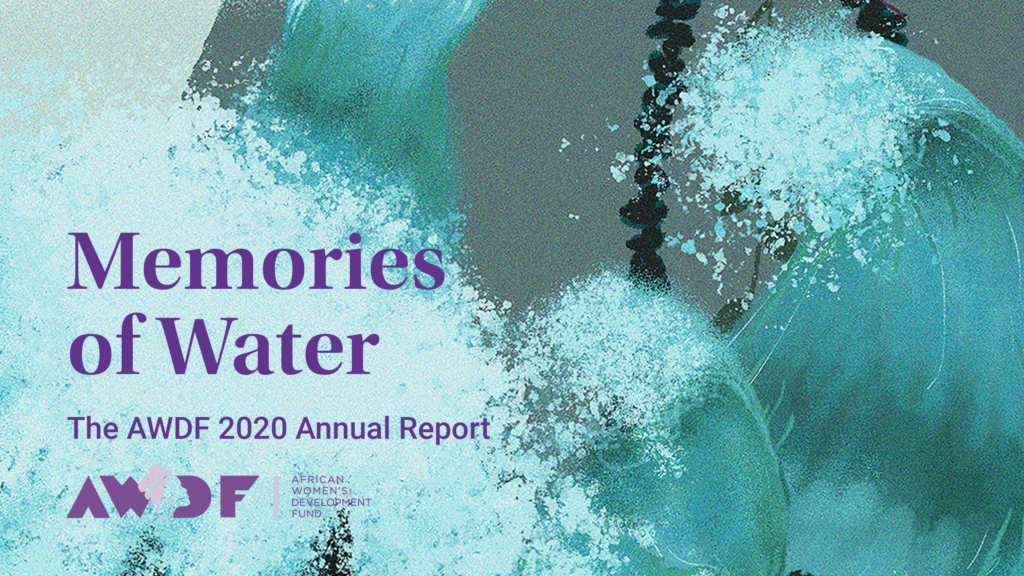
The AWDF 2020 Annual Report is a recollection of a year that, like water, held everything that came before it—the consequences of all it experienced, all the elements it contained. As told by African women, the report is a narrative of water remembering, water finding its way. A recollection of AWDF’s exceptional contribution to women’s rights in Africa, a celebration of the determination of the grantees, staff, the Board and our funders in an incredibly challenging year.
We awarded 136 grants and a total of USD $8,902,980 to organisations in 32 countries which is a 88.9% increase in total grantmaking from 2019. In response to the emergency elements of the year, including COVID-19 and anti-violence campaigns led by women’s rights organisations across the continent, AWDF gave a total of $122,000 in grants.
Against the tide, our grantee partners created visibility and voiced women’s rights issues, pushed and succeeded in putting laws in place that protect women, created understanding around harmful norms and policies, built women’s political, financial, and advocacy skills, increased women’s representation in political offices, improved women’s access to and ownership of property, contributed to increased budget allocations to public services, and responded to the needs of their community in a time of COVID-19 and other crises.
To learn more about our work, the innovations and impact made by AWDF grantees and our aspirations as we continue on this journey please read the full report.
Please click here for the summary of the report
To read the full report, please click here
[/tp]
[tp lang=”fr” not_in=”en”]
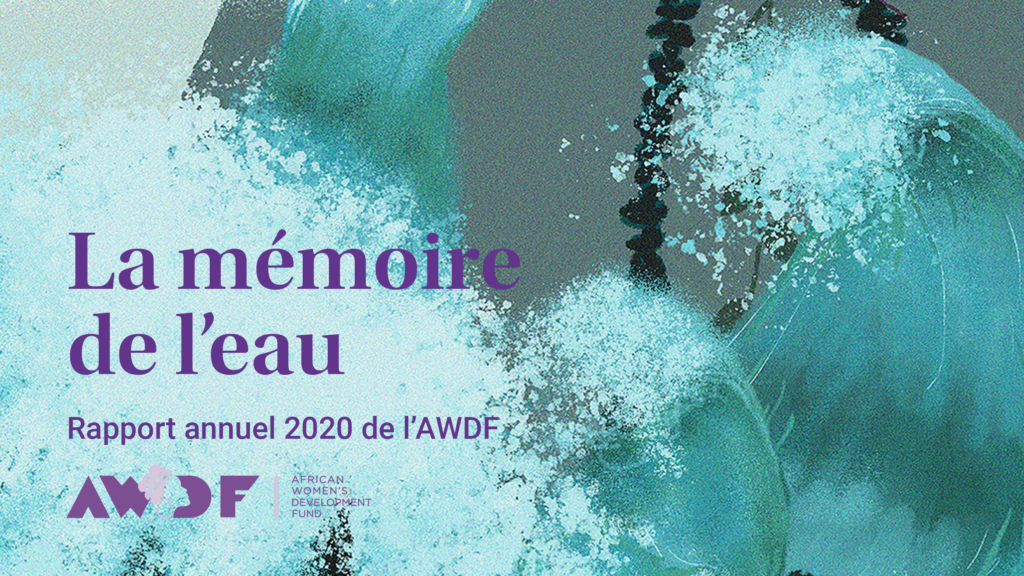
Ce rapport évoque le souvenir d’une année qui, comme l’eau, a gardé l’empreinte de tout ce qui l’a précédée — les conséquences de tout ce qu’elle a vécu, tous les événements dont elle était porteuse. Rapporté par des femmes africaines, il décrit le récit d’une eau qui fait mémoire, d’une eau qui se fraie un chemin. Ce rapport englobe les contributions exceptionnelles faites par l’AWDF pour la promotion des droits des femmes en Afrique. C’est une célébration de la détermination des partenaires bénéficiaires de subventions, du personnel, du conseil d’administration et de nos bailleurs de fonds au cours d’une année incroyablement difficile.
L’AWDF a octroyé 136 subventions et un total de 8 902 980 USD à des organisations dans 32 pays représentant ainsi une augmentation de 88,9% du total des subventions par rapport à l’année 2019. Pour répondre aux urgences de l’année, notamment la pandémie de Covid-19 et les campagnes anti-violence menées par les organisations de défense des droits des femmes à travers le continent, AWDF a octroyé des subventions d’une valeur de 122 000 USD.
En dépit du courant actuel que traverse le monde, nos partenaires bénéficiaires de subventions ont pu créer de la visibilité et exprimer les problèmes des droits des femmes ; pousser et réussir à mettre en place des lois qui protègent les femmes ; faire comprendre les normes et les politiques néfastes ; développer les compétences politiques, financières et de plaidoyer des femmes ; augmenter la représentation des femmes dans les instances politiques ; améliorer l’accès des femmes à la propriété ; contribuer à l’augmentation des allocations budgétaires aux services publics ; et répondre aux besoins de leur communauté en période de la pandémie de COVID-19 ainsi que d’autres crises.
Pour en savoir plus sur notre travail, sur les innovations, l’impact de nos bénéficiaires de subventions, et sur nos aspirations, veuillez lire le rapport complet.
Veuillez cliquer ici pour le résumé du rapport
Pour le rapport complet, veuillez cliquer ici
[/tp]
Exciting Consultancy Opportunities
Exciting Consultancy Opportunities

We are looking for a consultant to develop and implement a collectively agreed approach to feminist leadership training and follow up coaching to all Line Managers within the organisation. The training and coaching programme is intended to enable managers be more impactful in their leadership, and to improve on their management and coaching skills.
AWDF recognises the importance of ensuring that all staff with supervisory responsibilities have the requisite skills to lead, manage and coach their teams in ways that are aligned with our organisational values, principles and ethics as well as feminist leadership principles as outlined in the African Feminist Charter.
Please click here to download the Terms of Reference for more details.
2. Information Technology Transformation Initiative
AWDF is embarking on the development of an IT Transformation Initiative that will transform how it utilises technology to meet the strategic objectives of the organisation. We seek a consultant/team of consultants to undertake the design and implementation of the IT modernisation that will supports the needs of AWDF and which is characterised by risk management, flexibility, efficiency, productivity, and the transformation of policies and processes.
Please click here for Terms of Reference for this assignment
If this is you, we’d love to hear from you.
Closing date for submission of applications is 15th October 2021
Reflections on the generation of evidence for prevention of Violence Against Women
Reflections on the generation of evidence for prevention of Violence Against Women
 Decentring the colonial gaze: conversation on inclusive knowledge and evidence for Violence against Women Prevention in Africa
Decentring the colonial gaze: conversation on inclusive knowledge and evidence for Violence against Women Prevention in Africa
On September 09, 2021, the African Women’s Development Fund (AWDF), Raising Voices and the Sexual Violence Research Initiative (SVRI) unveiled an Introductory guide (also available in French) for the creation of prevention knowledge and evidence for African women’s rights organisations in a webinar themed Decolonised and Inclusive: Reflections on the generation of VAW prevention evidence for African Women’s Rights Organisations.
The Guide is an extension of the Violence Against Women (VAW) Prevention Primer (also available in French) produced by Rasing Voices and AWDF in 2019, providing an in-depth look into approaches to generating knowledge and evidence on the prevention of violence against women. It seeks to deconstruct the traditional framing on ownership of knowledge and evidence and prioritises methodologies and processes that centre the voices, needs and expertise of African women and women’s rights organisations.
Edna Ninsiima and AWDF’s Dinnah Nabwire reflect on the webinar and on issues arising from the discussions, in this article.
AWDF 2021 Recognition Survey Report
AWDF 2021 Recognition Survey Report

As part of our monitoring, evaluation and learning process, AWDF conducts grantees’ Recognition surveys annually to identify achievements and recognition of grantees supported. The recognition survey report focuses on highlighting grantees achievements and acknowledging their impact and contribution to achieving women’s equal rights and gender justice.
Read the 2021 Recognition Survey here
Consultancy: Inception of Initiative on Sexual Violence
Consultancy: Inception of Initiative on Sexual Violence

AWDF is embarking on an exciting multiyear initiative supported by the Ford Foundation to address sexual violence in West Africa. To support the Inception Phase of this work, we are looking to engage a consultant or a team of consultants preferably womxn from Africa who have in-depth understanding of (and commitment to) feminist principles.
We’d love to hear from Consultants who bring demonstrable expertise and knowledge of the landscape of women’s rights and approaches, organisations and networks and advocacy and campaigning organisations working on sexual violence particularly in West Africa.
Please find attached the full Terms of Reference and information on how to apply.
Closing Date for submission of proposals: 13th September 2021
Introducing the AWDF Knowledge Exchange Platforms
Introducing the AWDF Knowledge Exchange Platforms
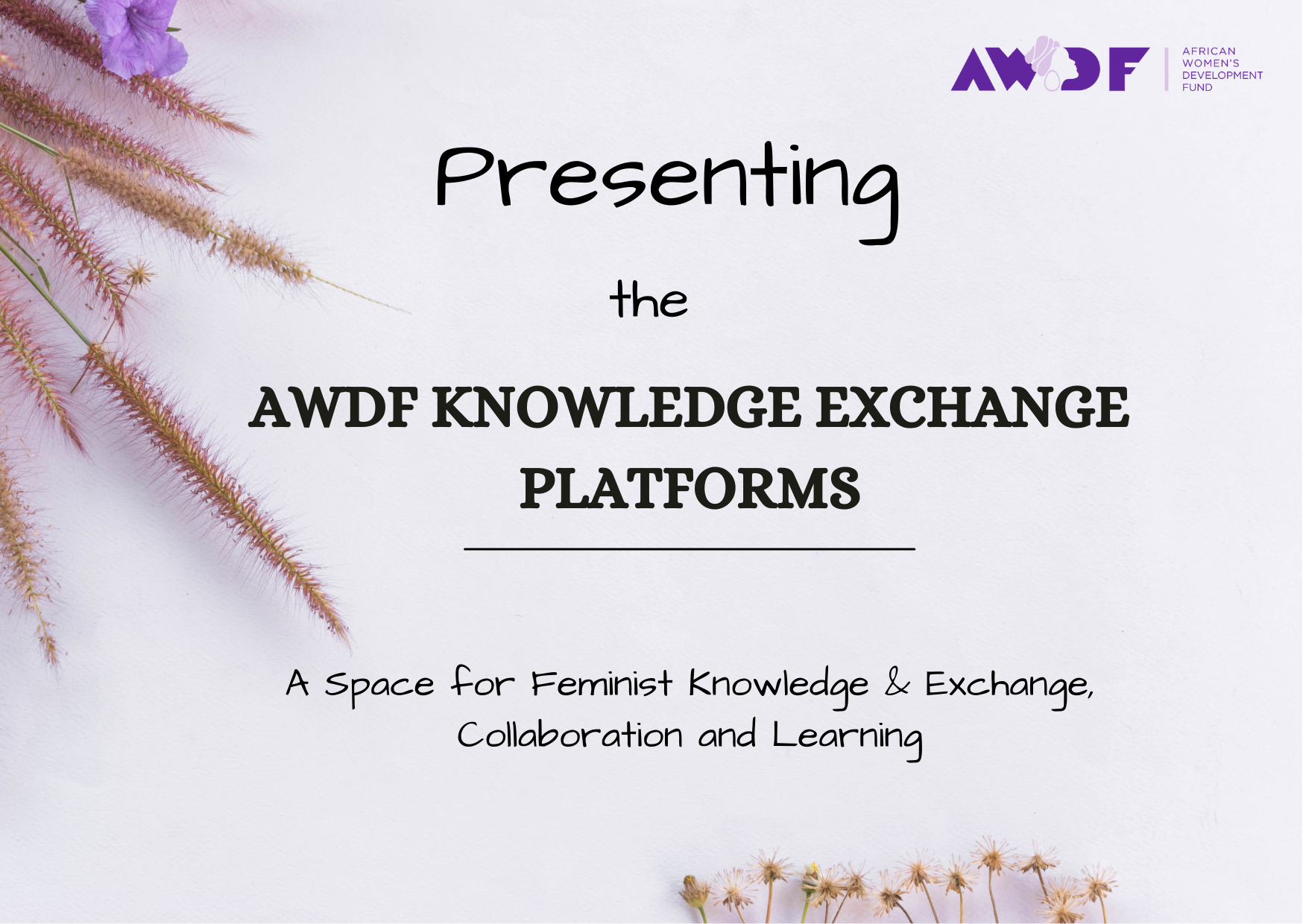
AWDF is excited to invite you to visit our redesigned Knowledge Exchange Platforms – AfriRep and the SAUTI Centre.
The AWDF Knowledge Exchange Platforms are generative, innovative and safe spaces (virtual and physical) for creative and diverse feminist learning, sharing and engagement. They are structured around AWDF’s responsibility to knowledge creators, subjects of content, users, and the broader community of the African feminist movement.
SAUTI Centre
The Sauti Centre is a semi-virtual space with a physical centre in Accra and an online catalogue. It aims to be a collaborative space for learning and is open to students, researchers, writers, activists among many others who are interested in African feminism. The Centre currently hosts over 3,000 materials in varied forms and formats. The materials cover a range of topics such as feminism, philanthropy and the African women’s movement.
We invite you to contact us if you want to use the space to host your own in-person or virtual session! In the past we have hosted panel discussions, small reflection meetings and film-screenings and are excited to co-host the same with you through the centre.
AfriRep
AfriRep is an open-source African feminist knowledge hub. Here you will find materials that range from research articles, Women Rights Organisations (WROs) reports and unpublished dissertations to toolkits on capacity building, lessons from feminist convenings and AWDF publications. Our aim is to make the tremendous knowledge that African women yield accessible and to strengthen the women’s movement through learning.
Here is a Tutorial Video to help you navigate through the sites.
Please email malaika@awdf.org if you have any feminist open-source materials that you would like us to review and upload on any of these platforms!
We invite you to visit our sites!
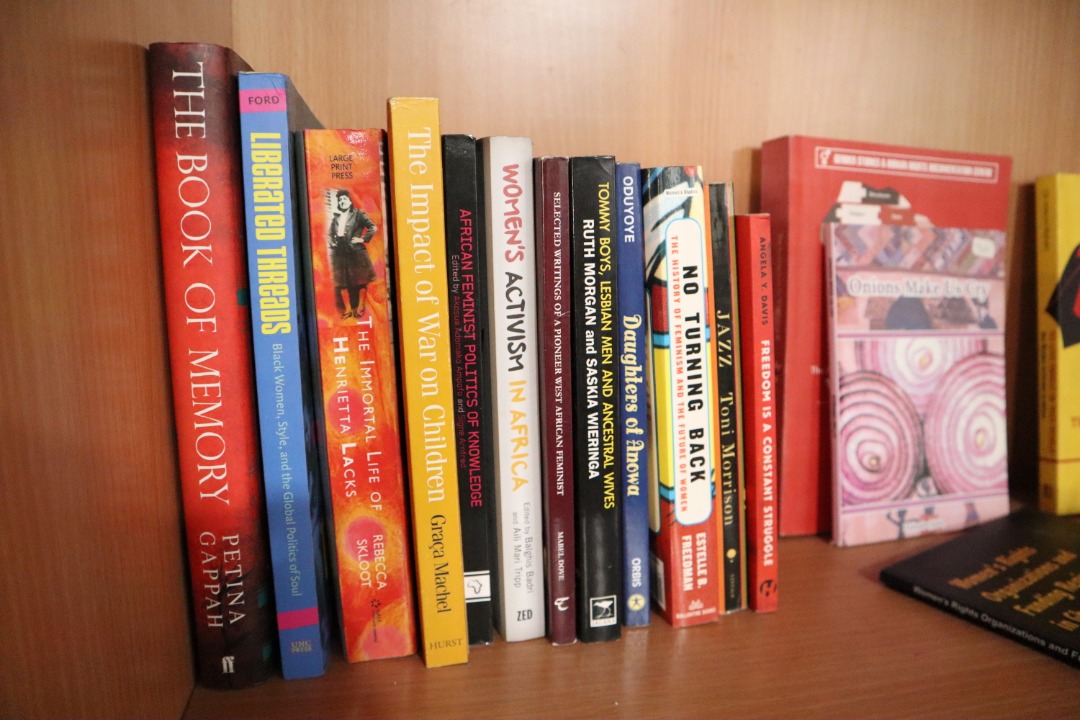
Consultancy: Developing our Strategic Framework
Consultancy: Developing our Strategic Framework
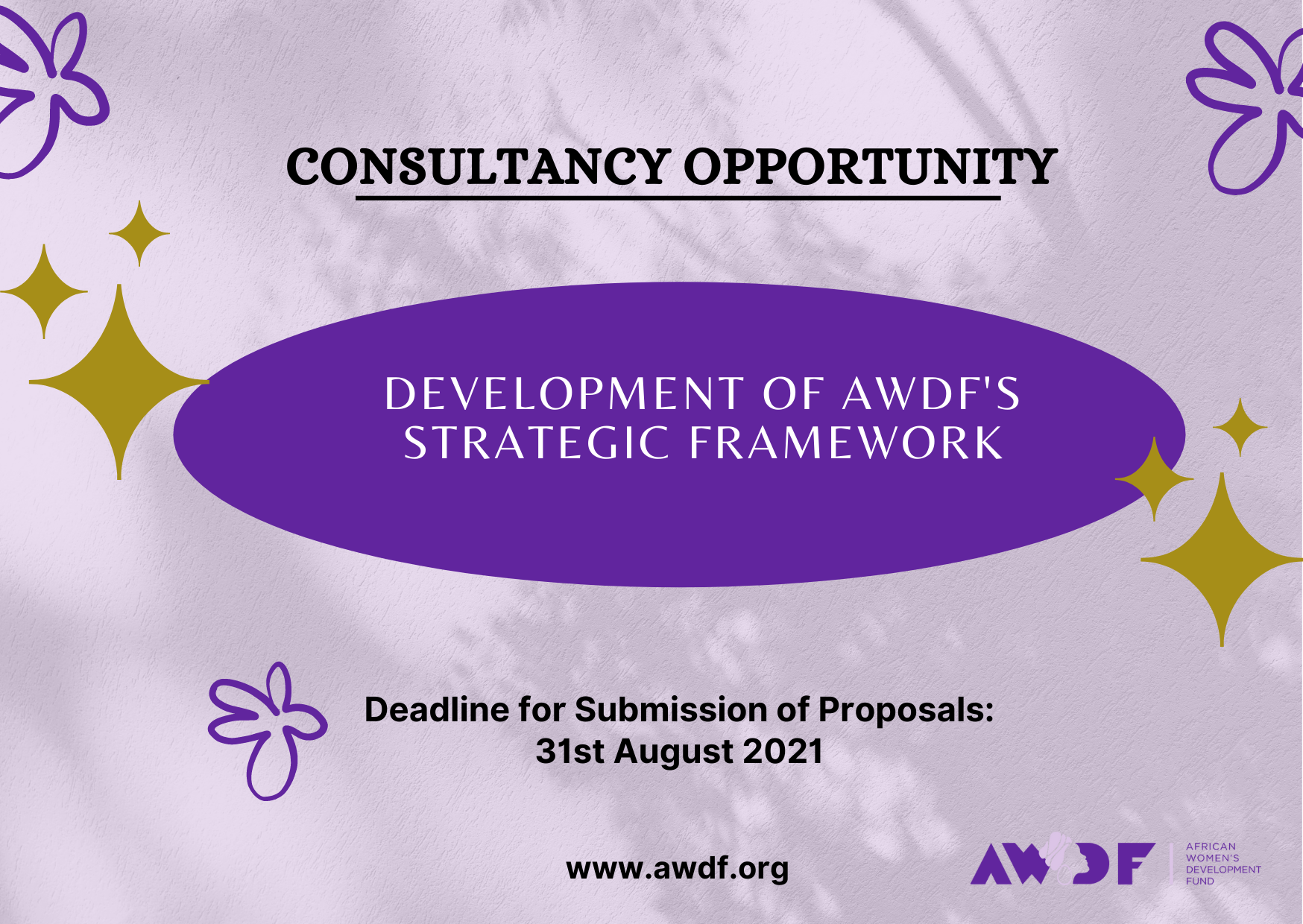
Established in 2000, the African Women’s Development Fund (AWDF) is a feminist grantmaking foundation that supports local, national and Africa regional women’s organisations working towards the promotion and realisation of women’s rights and recognition of African women’s leadership in all spheres of life. As an intersectional feminist organisation, we have an inclusive understanding of the word “women”.
As our current strategic plan, entitled “Shaping the Future”, is coming to a close, AWDF is now seeking to develop a new strategic framework to guide our work over the next ten years (2022-2032). This process comes at a critical time, as the world has experienced seismic changes since the above-mentioned were developed (including the challenges and opportunities facing African women, the organisations and movements that support their rights, and those affecting the regional and global ecosystem in which we operate), and as AWDF is reflecting on what growth means after 21 years of existence.
AWDF is therefore seeking to engage a consultant, a team of consultants or a consultancy firm to provide strategic, technical and facilitation support to AWDF in the development of our new strategic framework. The purpose of the strategic planning process is to develop a new strategic framework that will guide AWDF’s work and institutional transformations over the next ten years, with the aim to increase our impact and ability to fulfil our mandate. The consultancy will take place from September 2021 to March 2022.
The deadline for submission of proposals is 31 August 2021. Proposals should be sent by email to consultants@awdf.org with “Strategic Planning Consultancy” in the subject line. In line with AWDF’s mission, qualified and interested African women are encouraged to apply.
For more details about the consultancy, the preferred profile of the consultants, and how to apply, please download the full
Terms of Reference here
Call for Consultants: Project Design and Proposal Writing Training
Call for Consultants: Project Design and Proposal Writing Training

Purpose of the Consultancy
AWDF is seeking to support organisations who may want to apply to us for funding. To deliver this capacity building, we are seeking women who are expert individual/s or organisations to deliver training tailored to respond to the AWDF core thematic areas. The training for potential applicants will cover project design and proposal writing respectively.
To Apply, please click here for Terms of Reference
Please note that this consultancy is open only to Women Facilitators.
Deadline for submission: 31st August 2021


